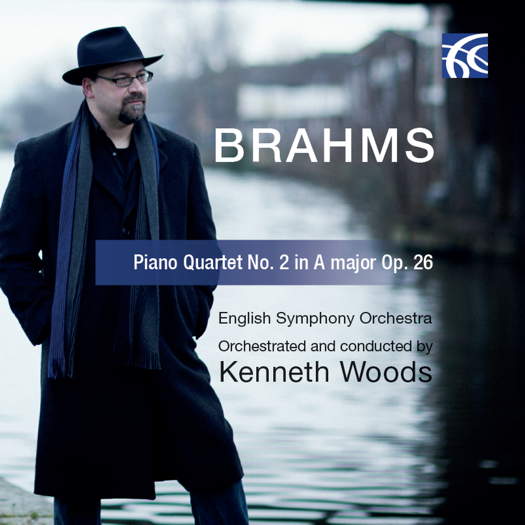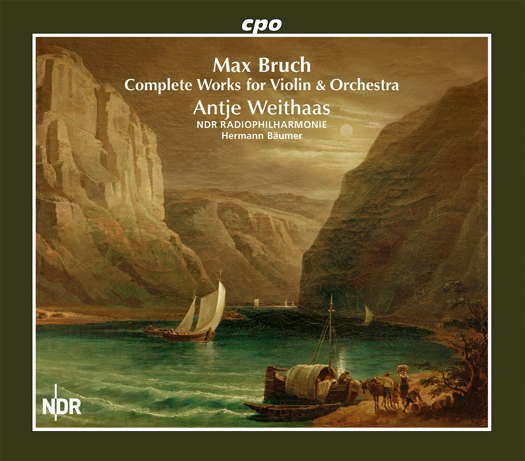 SPONSORED: CD Spotlight. A Very Joyous Disc - Brahms arranged by Kenneth Woods impresses Alice McVeigh.
SPONSORED: CD Spotlight. A Very Joyous Disc - Brahms arranged by Kenneth Woods impresses Alice McVeigh.
All sponsored features >>

Natural Sincerity
Max Bruch's complete works for violin and orchestra, enjoyed by GERALD FENECH
'Antje Weithass is an exceptionally gifted soloist, and her interpretations are phenomenally exciting, vibrant and consistently breathtaking.'
Nowadays, Max Bruch is considered as a composer of works for the violin. In addition to the first concerto, Op 26, the popularity of which continues undiminished, and, to the great annoyance of the composer, overshadowed much of his other work, we hear, rather spasmodically, the Scottish Fantasy and the second violin concerto. The fact that Bruch, in his day, was famous for his large-scale choral works is forgotten. Between 1870 and 1900 there were numerous performances of works such as Odysseus and Frithjof, earning for the composer a reputation that outshone even that of Brahms.
In view of this, this set is most welcome, as it gives one the opportunity to listen to a number of pieces for violin and orchestra that have fallen out of the repertoire.
Listen — Max Bruch: Andante con moto (Serenade Op 75)
(CD2 track 4, 2:23-3:18) ℗ 2021 cpo :
Max Bruch was born in Cologne on 6 January 1838, the same year that Bizet was born. He studied in his city of birth with Ferdinand Hiller and Carl Reinecke, two outstanding composers of the day. Extended journeys at home and abroad as a student were followed by a longer stay in Mannheim, where his opera Loreley was performed in 1863. The piece, which was dedicated to Mendelssohn, was a great success, and it brought him to the attention of a wider public. Bruch's first official appointments were as Kapellmeister, first in Koblenz (1865-1867) and then in Sondershausen (1867-1870), followed by a longer stay in Berlin and a period in Bonn (1873-1878). It was in the latter city that Bruch dedicated all his energies to composition.
After a short time as director of the Sternsche Choir in Berlin, in 1880 he was appointed conductor of the Liverpool Philharmonic Orchestra, leaving England in 1883 to become director of the Orchesterverein in Breslau. In 1891 he moved finally to Berlin and took over masterclasses in composition, with Respighi being one of his pupils. He retired in 1911 to devote himself once again to just composition. Bruch died in Berlin on 2 October 1920, aged eighty-two, leaving more than two hundred pieces for posterity. He was buried next to his wife who had died in August the previous year, at the Old St Matthaus churchyard in Berlin. His daughter Margaretha later had carved on the gravestone, 'Music is the language of God'.
These works, comprising Bruch's complete oeuvre for violin and orchestra, were issued by CPO on three separate discs. Now, the same label has grouped them together in one set at a reduced price, and I endorse this decision without reservation. The programme is made up of eight compositions written over a period of thirty-seven years (1866-1903), but only the ever popular first concerto, and to some extent the second, and the Scottish Fantasy are familiar; the rest, namely the third concerto, the Konzertstück, Op 84, the Serenade, Op 75, the Romance in A, Op 42, In Memoriam, Op 65 and the Adagio Appassionato, Op 57, are practically never performed.
Listen — Max Bruch: Adagio appassionato Op 57
(CD1 track 9, 0:00-0:54) ℗ 2021 cpo :
Bruch was a friend of both Sarasate and Joachim, two of the greatest nineteenth century performers of the violin, and their advice certainly served the composer in good stead. Indeed, all the works on this compilation are imbued with a joy and spontaneity that is truly magical, and the music has a delightful romantic flow full of passionate melodies and virtuosic surprises.
Listen — Max Bruch: Allegro appassionato (Konzertstück Op 84)
(CD3 track 4, 0:01-0:54) ℗ 2021 cpo :
Above all, Bruch's natural sincerity is all too evident in the harmonic warmth of these scores. Antje Weithass is an exceptionally gifted soloist, and her interpretations are phenomenally exciting, vibrant and consistently breathtaking. This music making splits the dark alleys of our being and inundates them with light. Hermann Baumer and his NDR Radio Philharmonie players give unbridled support. This is a smashing (re)issue which should not be missed, with fine sound and booklet notes.
Copyright © 29 January 2022
Gerald Fenech,
Gzira, Malta

CD INFO - BRUCH: COMPLETE WORKS FOR VIOLIN & ORCHESTRA



